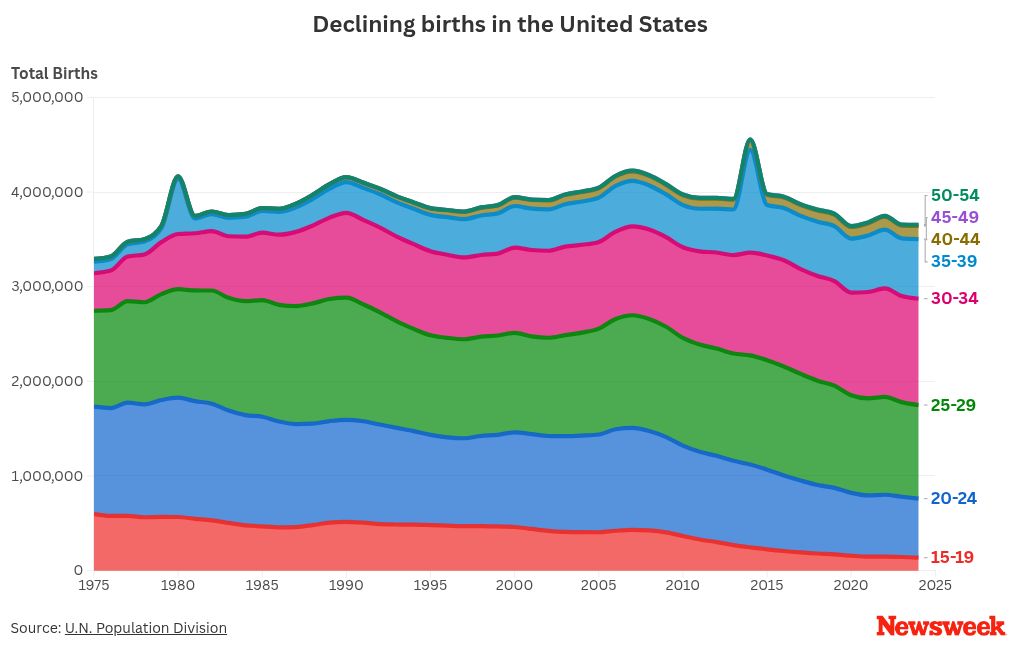New research has sparked fears about the American birth rate and whether there is any hope for it to improve.
Americans in their 20s and 30s are planning to have fewer children than a decade ago, according to Pew Research Center analysis published earlier this month.
The United States is one of many countries that has long been struggling with a falling number of births—Newsweek broke down how births in the United States have declined for the last 50 years here.
Governments, including Donald Trump‘s administration, have gone to great lengths to try and turn these trends but this new research brings into question whether they are working.
“Focusing on intentions rather than outcomes this study highlights the deeply complex and nuanced challenge of boosting birth rate,” a research fellow at the University of Oxford’s Institute of Population Aging told Newsweek.

Americans In Their 20s And 30s Planning To Have Fewer Children
Young couples now plan to have fewer than two children, with the total number of children that men and women between the ages of 20 and 39 plan to have dropping from 2.3 in 2012 to 1.8 in 2023, Pew researchers found.
This is below 2.1—the replacement level of births per woman required to maintain a stable population without immigration.
“These declines in the number of children adults plan to have occurred almost entirely in the last decade,” the analysis says.
But Jake Hays, a research associate at Pew Research Center, stressed that “intentions don’t necessarily predict the future.”
“But if these intentions do bear out, we would expect that these cohorts will have fewer children than previous cohorts did,” he told Newsweek.
He added that these findings are in line with other Pew research, which shows that a growing number of adults under the age of 50 who do not have children say they are unlikely to do so in the future.
“Among these adults, many said they just didn’t want to have kids or wanted to focus on other things like their job or other interests,” Hays said.
Similarly, last November, polling done by the Independent Center, in association with Newsweek, showed that 30 percent of Gen Zers (people born between 1997 and 2012) and millennials (people born between 1981 and 1996) did not have nor want any children.
Comparatively, 62 percent said they had or wanted to have children, while 9 percent said they were unsure.
Amy Blackstone, a sociology professor from the University of Maine and the author of Childfree by Choice: The Movement Redefining Family and Creating a New Age of Independence told Newsweek at the time: “Millennials have been telling us for years that they are concerned about the impact of humans on our climate, particularly in Western nations where our carbon footprints are grotesquely high.”
What Does This Mean For Future Birth Rates?
Cosco said that this research highlights how these intentions to have fewer children are part of the root cause of the birth rate crisis.
“By flagging lower intentions as an upstream issue, we recognize that both immediate and long‐term factors must be tackled well before births occur,” he said. “If there is going to be meaningful change in birth rates, upstream and downstream factors will need to be addressed in a comprehensive and accessible manner.”
Cosco continued: “Improving fertility is inherently multifaceted—no single policy will suffice—so we must address the personal, socioeconomic, and cultural factors that shape people’s family‐size intentions.”
Indeed, Hays said that in his research, he has found that many people believe free childcare would be “extremely or very effective” in encouraging them to have more children, followed by requiring employers to provide paid family leave, more tax credits for parents and giving parents of minor children a monthly payment.
Earlier this month, Trump announced a $1,000 tax-deferred investment account for American babies born during his second term.
The White House said the so-called “Trump Accounts” will “afford a generation of children the chance to experience the miracle of compounded growth and set them on a course for prosperity from the very beginning.”
Meanwhile, the United States could make childbirth free for privately insured families, in an effort to tackle declining birth rates.
The bipartisan Supporting Healthy Moms and Babies Act, which would designate maternity care as an essential health benefit under the Affordable Care Act, was introduced in the Senate in May.
However, while financial concerns are generally accepted as a major contributor to declining birth rates, they are not the lone cause – cultural shifts are playing a huge role.
American Vice President JD Vance touched on cultural changes when he said in January: “We failed a generation not only by permitting a culture of abortion on demand but also by neglecting to help young parents achieve the ingredients they need to lead a happy and meaningful life.
“Our society has failed to recognize the obligation that one generation has to another as a core part of living in a society. So let me say very simply, I want more babies in the United States of America.”
For example, Norway is considered a global leader in parental leave and child care policies, and the United Nations International Children’s Fund (UNICEF) ranks it among the top countries for family-friendly policies. But it, too, is facing a birth rate crisis.
The Nordic country offers parents 12 months of shared paid leave for birth and an additional year each afterward. It also made kindergarten (similar to a U.S. day care) a statutory right for all children aged 1 or older in 2008.
And yet, Norway’s fertility rate has dropped dramatically from 1.98 children per woman in 2009 to 1.44 children per woman in 2024, according to official figures. The rate for 2023 (1.40) was the lowest ever recorded fertility rate in the country.
Newsweek spoke to several experts about Norway specifically, who all cited recent culture changes.
The post Gen Z and Millennials Spark US Birth Rate Fears appeared first on Newsweek.




